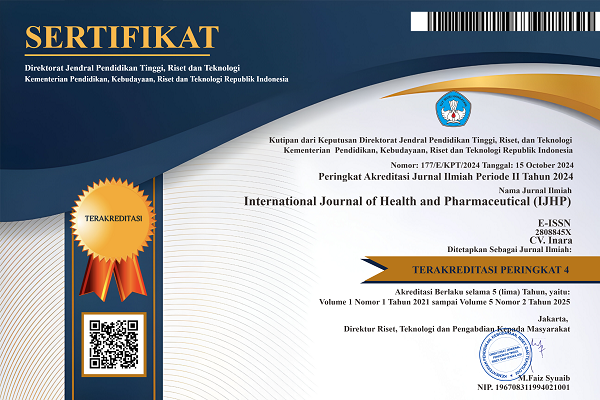Analysis Of The Effect Of Employee Readiness On The Implementation Of Accreditation At Royal Prima Medan Rsu
DOI:
https://doi.org/10.51601/ijhp.v2i3.67Abstract
Hospitals are required to carry out accreditation to improve the quality of
health services, some employees feel accreditation is a workload and they
are not ready to carry out the sustainability of hospital accreditation. The
purpose of this study was to analyze the relationship between employee
readiness and the sustainability of hospital accreditation. This research is
an analytic study with a cross-sectional approach. The study was
conducted at Royal Prima Hospital Medan. The study population was 230
people and a sample of 70 people. Sampling by stratified random
sampling. Data analysis used univariate, bivariate with chi-square test,
and multivariate with multiple logistic regression at the 95% confidence
readiness to change, management support, and self-benefit with the
continuation of hospital accreditation at the Royal Prima Hospital in
Medan, p <0.05. While the unrelated variable is confidence, p> 0.05. The
variable that has the greatest relationship with the sustainability of
hospital accreditation is management support with the value Exp (B) / OR
= 18.978. The management of Royal Prima Hospital needs to continue to
support the improvement of the quality and professionalism of employees
with continuing education and training to improve the quality and safety of
patients at Royal Prima Hospital Medan.
Downloads
References
Aditama, T. Y. (2015). Manajemen Administrasi Rumah Sakit. Jakarta: UI Press.
Azwar, A. (2015). Menjaga Mutu Pelayanan Kesehatan. Jakarta: Pustaka Sinar Harapan.
Fitriyanto, A. (2016). Ketidakpastian Memasuki Dunia Kerja Karena Pendidikan. Jakarta: Rineka Cipta.
Herminanto, S. (2013). Kesiapan Kerja Siswa STM di Jawa. Yogyakarta: IKIP Yogyakarta.
KARS. (2012). Instrumen Akreditasi Rumah Sakit versi 2012. Jakarta: Komite Akreditasi Rumah Sakit.
KARS. (2017). Standar Nasional Akreditasi Rumah Sakit Edisi 1. Jakarta: Komite Akreditasi Rumah Sakit.
Kemenkes RI. (1998). Peraturan Kementerian Kesehatan (Permenkes) RI No. 159a/Menkes/PER/II/1998
Tentang Rumah Sakit. Jakarta: Kementerian Kesehatan Republik Indonesia.
Kemenkes RI. (2011). Standar Akreditasi Rumah Sakit. Jakarta: Kementerian Kesehatan Republik Indonesia.
Kemenkes RI. (2012). Peraturan Menteri Kesehatan Republik Indonesia Nomor 012 Tahun 2012 Tentang
Akreditasi Rumah Sakit. Jakarta: Kementerian Kesehatan Republik Indonesia.
Leonarda, R. (2011). Gambaran Persiapan Penilaian Akreditasi Rumah Sakit Bersalin Asih Jakarta Tahun 2011.
Universitas Indonesia.
Lumenta, N. (2013). Akreditasi Rumah Sakit di Luar Negeri. Jakarta: Makalah dalam pelatihan akreditasi RS di
Dinkes Provinsi DKI Jakarta.
Nasution, S. (2015). Berbagai Pendekatan dalam Proses Belajar Mengajar. Jakarta: Bumi Aksara.
Notoatmodjo, S. (2015). Metodologi Penelitian Kesehatan (Cetakan 2). Jakarta: Rineka Cipta.
Sekretariat Negara RI. (2009). Undang-Undang No. 36 Tahun 2009 tentang Kesehatan. Jakarta: Sekretariat
Negara Republik Indonesia.
Slameto. (2013). Belajar dan Faktor-Faktor yang Mempengaruhinya. Jakarta: Rineka Cipta.
Soepojo, P., Koentjoro, T., & Utarini, A. (2012). Bechmarking system akreditasi rumah sakit di Indonesia dan
Australia. Jurnal Manajemen Pelayanan Kesehatan, 2(2), 1–8.
Theo, D. (2009). Analisa Manfaat Akreditasi Rumah Sakit. FKM Universitas Sumatera Utara.
Ziaee, R., & Bologna, J. (2015). Preparing for Continuous Quality ImprovementFor Healthcare: Sustainability
through Functional Tree Structure. Broken Sound Parkway NW: RC Press Taylor and Francis Group
Downloads
Published
How to Cite
Issue
Section
License
Copyright (c) 2022 muhammad Asyraf, Marlinang Isabella Silalahi, Sri Lestari Ramadhani, Sri Ulina Karo-karo

This work is licensed under a Creative Commons Attribution-NonCommercial 4.0 International License.





























